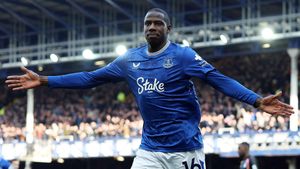On February 1, 2025, the Democratic National Committee (DNC) elected Ken Martin as their new Chair during the winter meeting held at National Harbor, Maryland. The election showcased not just Martin’s strong leadership within his home state of Minnesota but also represented a significant shift for the party as it faces upcoming national challenges.
Martin’s election marks the culmination of his 14-year tenure as the Chair of the Minnesota Democratic-Farmer-Labor (DFL) Party, where he has been instrumental in leading Democrats to victories across an unprecedented number of statewide elections. “The Democratic Party is the party of working people, and it’s time to roll up our sleeves and outcompete everywhere, in every election, and at every level of government,” Martin stated after his decisive victory.
Along with Martin, the DNC elected several other key officials: Reyna Walters-Morgan as Vice Chair for Civic Engagement and Voter Participation, and three Vice Chairs—Artie Blanco, Malcolm Kenyatta, and David Hogg. Jason Rae continues as Secretary, Virginia McGregor serves as Treasurer, and Chris Korge remains as National Finance Chair. Each individual brings unique experiences and perspectives to the party's leadership.
Walters-Morgan, formerly the DNC's Voter Protection Director, expressed her commitment to championing voting rights. Meanwhile, Kenyatta, Pennsylvania’s first openly LGBTQ+ person of color elected to the General Assembly, has made significant strides advocating for educational equity and economic opportunities.
Rae and McGregor maintain their roles integral to the DNC's organization, with Rae recognized for being the youngest individual ever elected to the committee. Korge, known for his fundraising acumen, will continue to leverage his extensive connections to support the party financially.
The voting results underscored Martin’s popularity, with 246.5 votes cast for him, leaving his opponents—Ben Wikler, Martin O'Malley, Faiz Shakir, and others—far behind. “We got punched in the mouth in November. It's time to get off the mat, dust ourselves off and get back in this fight,” Martin declared, emphasizing the need for resilience and unity as the Democrats adapt to new realities following electoral setbacks.
Although Democrats lost control of Congress and the presidency, Martin’s ascendancy signals hope for revitalizing party strategies. His record of success includes passing groundbreaking voting rights legislation, particularly during his tenure as DFL Chair; this background positions him to strengthen the DNC's efforts toward voter mobilization and grassroots engagement.
Despite the positive reception of Martin's candidacy, the election marked the first time since 2011 the DNC has not been led by a woman or person of color, raising concerns within some progressive circles about representation. This outcome highlighted necessary discussions around diversity and inclusiveness as the party seeks to rejuvenate its identity.
Political observers noted this leadership change as part of broader challenges confronting the DNC. Advocates within the party have urged leaders to work more diligently to connect with working-class voters, particularly among Black and Latino demographics, who have increasingly distanced themselves from the party.
During his campaign, Martin acknowledged these challenges, stating, “We must ask ourselves each day, whose side are we on? Are we on the side of the robber baron, the ultra-wealthy billionaire, the oil and gas polluter, the union buster? Or are we on the side of the American working family?” This commitment indicates Martin’s vision of aligning the DNC with working families across the country.
The DNC plays a pivotal role as the organizational backbone of the Democratic Party, coordinating with state parties to set platforms and elect candidates at all levels. With increasing focus, Martin expressed his intention to instill renewed confidence and commitment to Democratic procedures, especially as the party gears up for the next election cycles.
According to reports, the DNC is also poised to revisit its primary calendar, with Martin promising fair consideration for which states vote first. He acknowledges New Hampshire's entrenched position, potentially leading to another contentious standoff similar to previous years.
Following the election, many within the DNC voiced optimism about Martin’s lead as he combines experience with prevailing progressive values, indicating substantial potential to reshape the party's future. Yet, the path remains complex as the DNC faces not only political rivalries but also discerning and addressing its internal dynamics.
Martin’s tenure will likely be defined by how well he can reconstruct the party's relationships with its core constituents, including the important segments who feel alienated. His rallying cry resonates: “This is a new DNC.” Martin's leadership signifies both promise and responsibility as the party readies itself for the challenges of uniting and mobilizing Americans for the struggles ahead.



